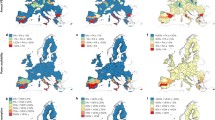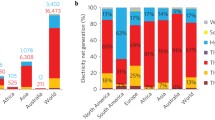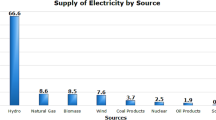Abstract
The availability of electric power is an important prerequisite for the development or maintenance of high living standards. Global change, including socio-economic change and climate change, is a challenge for those who have to deal with the long-term management of thermoelectric power plants. Power plants have lifetimes of several decades. Their water demand changes with climate parameters in the short and medium term. In the long term, the water demand will change as old units are retired and new generating units are built. The present paper analyses the effects of global change and options for adapting to water shortages for power plants in the German capital Berlin in the short and long term. The interconnection between power plants, i.e. water demand, and water resources management, i.e. water availability, is described. Using different models, scenarios of socio-economic and climate change are analysed. One finding is that by changing the cooling system of power plants from a once-through system to a closed-circuit cooling system the vulnerability of power plants can be reduced considerably. Such modified cooling systems also are much more robust with respect to the effects of climate change and declining streamflows due to human activities in the basin under study. Notwithstanding the possible adaptations analysed for power plants in Berlin, increased economic costs are expected due to declining streamflows and higher water temperatures.
Similar content being viewed by others

References
Aguiar R, Goncalves H, Oliveira M, Reis MJ (2002) Energy. In: Santos FD, Forbes K, Moita R (eds) Climate change in Portugal. Scenarios, Impacts and Adaptation Measures - SIAM Project. Lisbon. http://www.siam.fc.ul.pt/SIAM_Book/9_Energy.pdf
Blazejczak J, Gornig M, Hartje V (2011) Downscaling nonclimatic drivers for surface water vulnerabilities in the Elbe river basin. Reg Environ Change. doi:10.1007/s10113-011-0237-6
BUND (2009) Wärmelast Rhein. BUND, Freiburg
Cash DW, Moser SC (2000) Linking global and local scales: designing dynamic assessment and management processes. Glob Environ Change 10:109–120
Easterling WE (1997) Why regional studies are needed in the development of full-scale integrated assessment modelling of global change processes. Glob Environ Change 7(4):337–356
Feeley TJ, Skone TJ, Stiegel GJ, McNemar A, Nemeth M, Schimmoller B, Murphy JT, Manfredo L (2008) Water: a critical resource in the thermoelectric power industry. Energy 33:1–11
Fink AH, Brücher T, Krüger A, Leckebusch GC, Pinto JG, Ulbrich U (2004) The 2003 European summer heat waves and drought—synoptic diagnosis and impacts. Weather 59(8):209–216
Gough C (2008) State of the art in carbon dioxide capture and storage in the UK: an expert review. Int J Greenhouse Gas Control 2:155–168
Grossmann M, Koch H, Lienhoop N, Vögele S, Mutafoglu K, Möhring J, Dietrich O, Kaltofen M (2011) Economic risks associated with low flows in the Elbe River Basin (Germany): an integrated economic-hydrologic approach to assess vulnerability to climate change. Reg Environ Change (submitted)
Hattermann F, Wattenbach M, Krysanova V, Wechsung F (2005) Runoff simulation on the macroscale with the ecohydrological model SWIM in the Elbe catchment—validation and uncertainty analysis. Hydrol Process 19:693–714
Hurd B, Harrod M (2001) Water resources: economic analysis. In: Mendelsohn R (ed) Global warming and the American economy. Edward Elgar, Cheltenham, pp 106–131
IAEA (2004) Operating Experience with Nuclear Power Stations in Member States in 2003. IAEA, Vienna
IPCC (2001) Climate change 2000, summary for policy makers. Cambridge University Press, Cambridge
IPCC (2007) Summary for policymakers. Climate change 2007: impacts, adaptation and vulnerability. In: Parry ML, Canziani OF, Palutikof JP, van der Linden PJ, Hanson CE (eds) Contribution of Working Group II to the Fourth Assessment Report of the Intergovernmental Panel on Climate Change. Cambridge University Press, Cambridge
Jones RN, Dettmann P, Park G, Rogers M, White T (2007) The relationship between adaptation and mitigation in managing climate change risks: a regional response from North Central Victoria, Australia. Mitig Adapt Strategies Glob Chang 12:685–712
Kaden S, Schramm M, Redetzky M (2008) Large-scale water management models as instruments for river catchment management. In: Wechsung F, Kaden S, Behrendt H, Klöcking B (eds) Integrated analysis of the impacts of global change on environment and society in the Elbe Basin. Weißenseeverlag, Berlin pp 217–227
Kirshen P, Ruth M, Anderson W (2008) Interdependencies of urban climate change impacts and adaptation strategies: a case study of Metropolitan Boston USA. Clim Change 86:105–122
Koch H, Grünewald U (2009) A comparison of modelling systems for the development and revision of water resources management plans. Water Resour Manag 23:1403–1422
Koch H, Vögele S (2009) Dynamic modelling of water demand, water availability and adaptation strategies for power plants to global change. Ecol Econ 68:2031–2039. doi:10.1016/j.ecolecon.2009.02.015
Koch H, Grünewald U, Kaltofen M, Kaden S (2009) Anpassungsstrategien für die Wasserbewirtschaftung an den globalen Wandel im Einzugsgebiet der Spree. Korrespondenz Wasserwirtschaft 11:600–605
LAWA (1991) Grundlagen für die Beurteilung von Kühlwassereinleitungen in Gewässer. Erich Schmidt Verlag, Berlin
Mohseni O, Stefan HG, Erickson TR (1998) A nonlinear regression model for weekly stream temperatures. Water Resour Res 34(10):2685–2692
Nash JE, Sutcliffe JV (1970) River flow forecasting through conceptual models part I - A discussion of principles. J Hydrol 10:282–290
Orlowsky B, Gerstengarbe FW, Werner PC (2008) A resampling scheme for regional climate simulations and its performance compared to a dynamical RCM. Theor Appl Climatol 92(3–4):209–223
Rachimow C, Pfützner B, Finke W (2003) Untersuchungen zum Einfluss des globalen Wandels in Klima und Gesellschaft auf Wasserdargebot und -verfügbarkeit im Großraum Berlin. Bundesanstalt für Gewässerkunde, Koblenz: BfG-Bericht 1387
Rothman DS (2000) Measuring environmental values and environmental impacts: going from the local to the global. Clim Change 44:351–376
Rebetez M, Dupont O, Girond M (2009) An analysis of the July 2006 heat wave extent in Europe compared to the record year of 2003. Theor Appl Climatol 95:1–7
Rothstein B, Müller U, Greis S, Schulz J, Scholten A, Nilson E (2008) Elektrizitätsproduktion im Kontext des Klimawandels. KW Korrespondenz Wasserwirtschaft 1(10):555–561
UNEP (2003) Impacts of summer 2003 heat wave in Europe. UNEP, Nairobi
Werner PC, Gerstengarbe FW (1997) Proposal for the development of climate scenarios. Clim Res 8(3):171–182
Wilbanks TJ, Kates RW (1999) Global changes in local places: how scale matters. Clim Change 43:601–628
Wilbanks TJ, Leiby P, Perlack R, Ensminger JT, Wright SB (2007) Towards an integrated analysis of mitigation and adaptation: some preliminary findings. Mitig Adapt Strategies Glob Chang 12:713–725
Wilson EJ, Friedmann SJ, Pollak MF (2007) Research for development: incorporating risk, regulation, and liability for carbon capture and sequestration. Environ Sci Technol 41(17):5945–5952
Yohe G (2000) Assessing the role of adaptation in evaluating vulnerability to climate change. Clim Change 46:371–390
Zebisch M, Grothmann T, Schröter D, Hasse C, Fritsch U, Cramer W (2005) Climate change in Germany—vulnerability and adaptation of climate sensitive sectors. Umweltbundesamt. Climate Change 10/05. Dessau
Author information
Authors and Affiliations
Corresponding author
Rights and permissions
About this article
Cite this article
Koch, H., Vögele, S., Kaltofen, M. et al. Trends in water demand and water availability for power plants—scenario analyses for the German capital Berlin. Climatic Change 110, 879–899 (2012). https://doi.org/10.1007/s10584-011-0110-0
Received:
Accepted:
Published:
Issue Date:
DOI: https://doi.org/10.1007/s10584-011-0110-0



